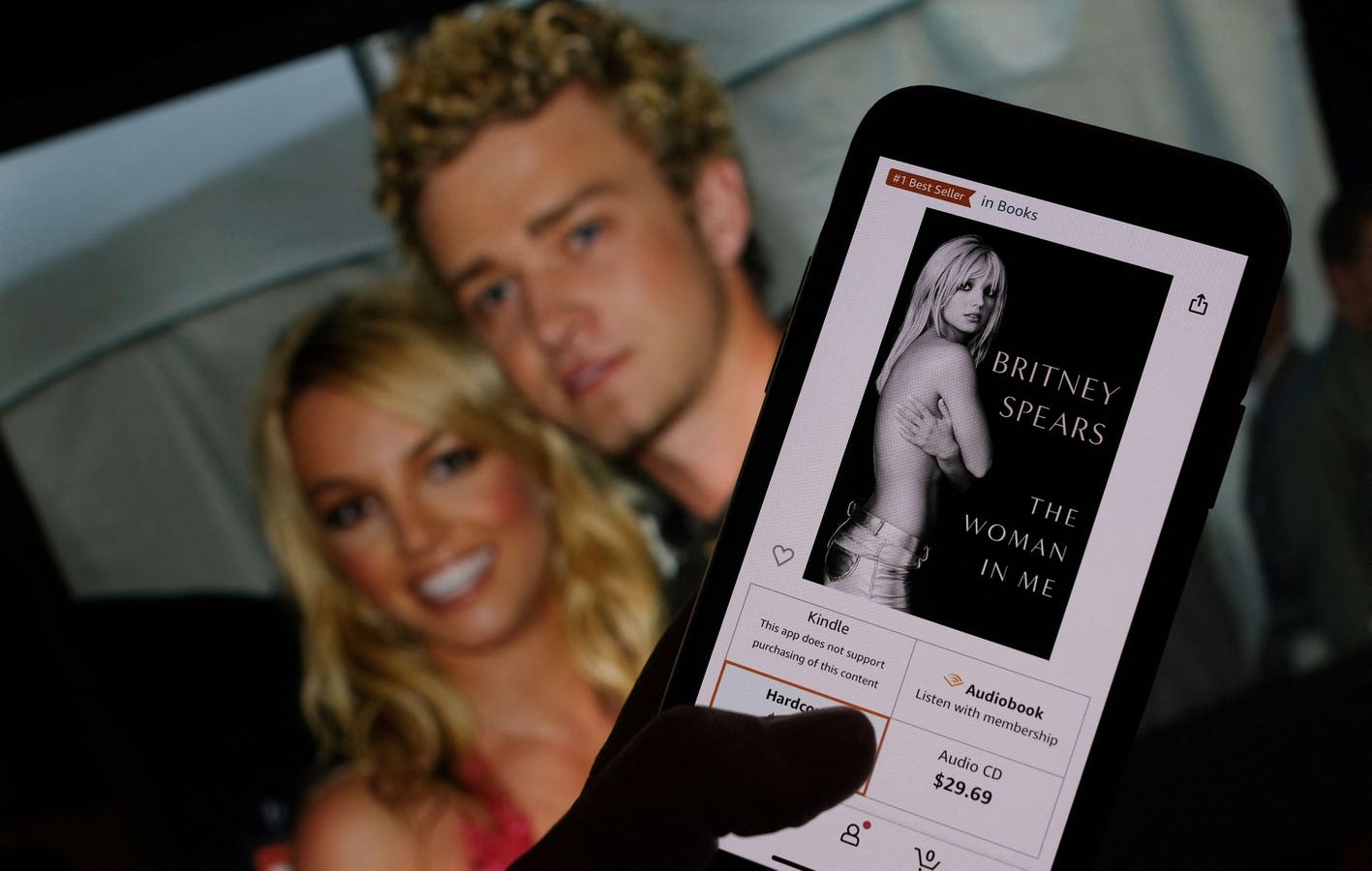Most people know Britney Spears as one of the most powerful artists in the pop music industry since her rising teen stardom of the 1990s. But Spears reveals how that fame forced her to grow up fast in her new tell-all memoir, The Woman In Me.
Told by Spears herself, the memoir delves into her personal story, hitting all the nostalgic notes while providing an inside perspective of the tabloid photos we have been obsessed with since the 90s. She writes about her relationships with everyone from Justin Timberlake and Madonna to Christina Aguilera and Paris Hilton, recounting a larger-than-life fairy tale of her rise to fame.
But like most fairy tales, there is a dark demon that has haunted all aspects of this pop princess’ life – her body, her talent and her role as a mother, daughter and star. That darkness is shame.
It is no secret that Spears’ appearance and actions have been put under a microscope for decades. From negative comments about her more provocative outfits choices to buzz about the 2007 head-shaving incident heard around the world, Spears has faced public shame in all its forms.
In her book, she provides readers with a glimpse of her struggles with the harsh criticism and self-restriction based on what others were saying about her body image and the way she dressed – most chilling was a circumstance where Spears claims that early in her career MTV put her on camera to ask her about how she felt about the criticism of others about her body and sexuality. This was compounded and juxtaposed when interviewers barraged a much too young Spears with questions as to whether her breasts were real or fake when her counterparts like singer (and her then boyfriend) Justin Timberlake were asked about their talent and aspirations.
One of the most shocking many-decades-later reveals in Spears’ expose is about her tumultuous relationship with Timberlake. While most fans and news outlets covered their breakup, Spears’ book gives her a space to finally unlock a burden she had been carrying silently — that during their relationship, she became unexpectedly pregnant. The enormous pressure and heartbreak that soon followed led Spears to decide to have an abortion.
While the southern girl in her remained polite and muted at the time, the media villainized her as a “cheater.” This narrative only culminated in the music video for Timberlake’s 2002 hit, “Cry Me a River” which suggested that Spears was the perpetrator in their partnership. The dumbfounding but also eerily familiar story is that this woman was pressured to make a choice that haunted and broke her. She made the choice to keep it to herself and endured tremendous shame for what was inferred about her rather than what she actually did.
And the shame was one-sided. There was no mass negative backlash or judgment for Timberlake. While Spears provides just enough shade on Timberlake to reveal that his wannabe appropriation is not so endearing 20 years later, she also has the class to forgive him.
Spears’ book also explores her identity as a mother. As she grew into motherhood the public shame continued to expand and exploit the way her children were kept from her.
She poignantly shares that shaving her head in 2007 was the most alienating action she could take because it stripped her of her ultimate weapon in the industry — her femininity and sexual power. But what is the point of power if it shackles you with guilt and shame and pressure?
Despite the media’s coverage of another “Hollywood woman gone mad tale,” Spears reveals she had a reason to make this change and it’s rooted in her love for her family. The context around her head shaving scandal: postpartum. Without her children, Spears felt even more alone and in pain. Her vulnerable accounts reveal that she was very much imprisoned from revealing the woman within her.
The Woman In Me does have bias – as all autobiography tales do. The circumstances that the media was obsessed with have no doubt been further exacerbated by the fact that Spears is as she admits, a woman who has struggled with mental health issues her whole life.
But mental health issues should not entitle her family (namely her father and complicit mother), ex-partners and close friends to exploit, and very consciously feed, the media with exactly what they wanted – evidence of peculiar behavior by a woman the world adorned as “sexy” before she was legal. Spears’ ultimate punishment for the media’s shameful creation was a well-orchestrated and sickening conservatorship that seems to exploit her mental health rather than provide her help and support.
The media and public continue to try and prove that the shame in Spears’ game is justified whether they attack her for her past or comment on her present, sometimes strange or explicit, social media posts. People will probably never stop spinning Spears’ story and other powerful and judged women figures alike, but at least she can advocate for herself through her own written word.
As such, The Woman In Me should be a required reading for women who are mothers, daughters, and sisters. Spears’ book reminds us that we have the power to reject shame as a misogynistic theme in the media and evoke empathy and true understanding when anyone is battling mental health issues.
We, as a society, need to recondition and be capable of praising talent and fame without feeding into the polarity of a public takedown. Finding the human in all of us starts with a shared mindset of intolerance towards unnecessary and uninformed judgment.
Read the full article here





